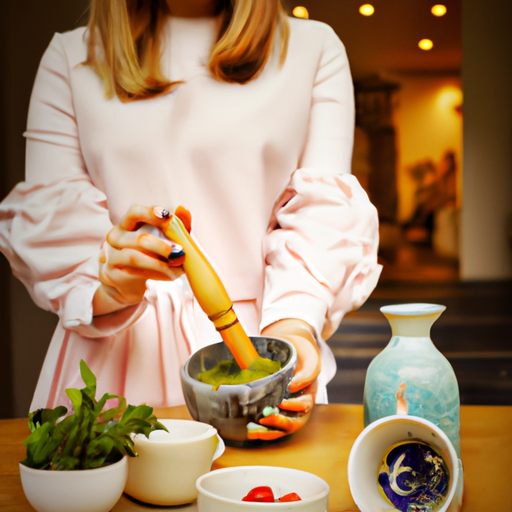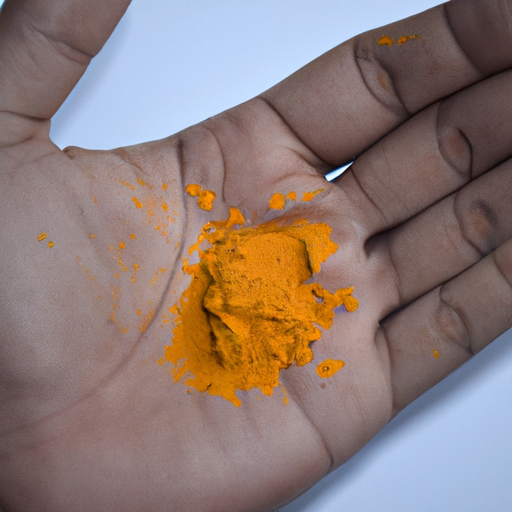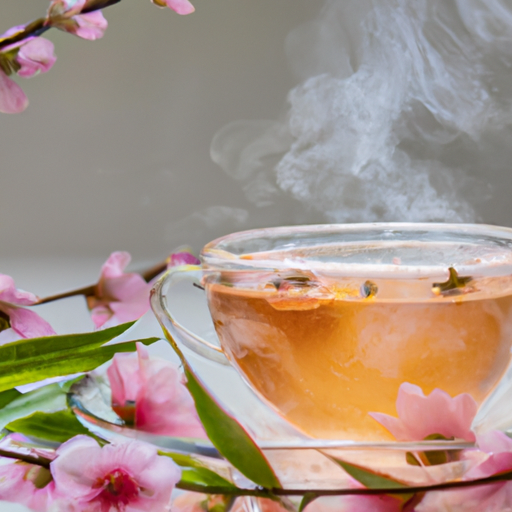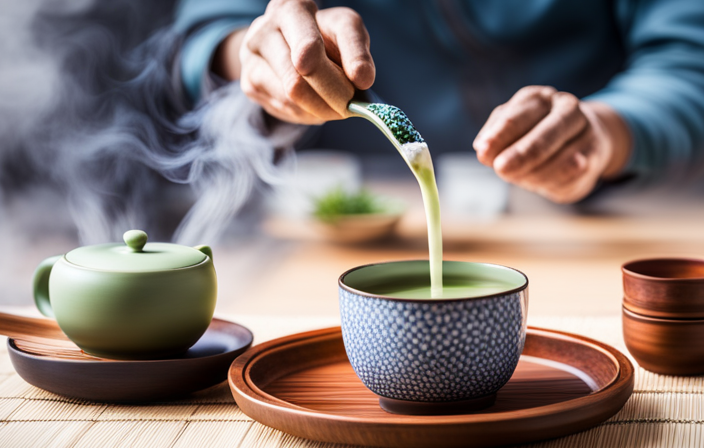Turmeric Tea
Is It Bad To Drink Turmeric At Night

Approximately 70 million Americans are affected by sleep disorders. If you are among them, you may have come across the potential benefits of turmeric for improving sleep quality. But is it safe to consume turmeric before bedtime?
In this article, we will explore the science behind turmeric’s sleep benefits and discuss factors to consider when consuming it in the evening.
Turmeric, a vibrant yellow spice commonly found in curry dishes, has been used for centuries in traditional medicine for its anti-inflammatory properties. Recent studies suggest that it may also have sleep-enhancing effects. Turmeric contains a compound called curcumin, which has been shown to modulate neurotransmitters and promote relaxation.
However, it’s important to note that individual responses to turmeric can vary. Factors such as dosage, personal sensitivities, and potential interactions with medications should be taken into account. Additionally, incorporating turmeric into nighttime rituals, such as in calming teas or golden milk, can enhance its potential sleep benefits.
While turmeric may offer promising sleep benefits, it’s always best to consult with a healthcare professional before making any significant changes to your sleep routine. They can provide personalized advice and help you explore alternative sleep aid options if needed.
Key Takeaways
- Turmeric has potential benefits for sleep, including promoting relaxation and modulating neurotransmitters.
- Turmeric consumption in the evening may lead to restless nights and vivid dreams, so dosage and personal sensitivities should be considered.
- Turmeric can enhance melatonin production and improve sleep quality, helping with falling asleep faster and promoting deep sleep.
- Turmeric alone may not be a cure-all for sleep issues, and it’s important to consider lifestyle changes, natural remedies, and consult with healthcare professionals for guidance.
The Benefits of Turmeric for Sleep
You’ll be amazed at how turmeric can work wonders for your sleep! Turmeric, a spice known for its vibrant yellow color and distinct flavor, has been used for centuries in traditional medicine. But did you know that it can also play a role in reducing insomnia and improving sleep quality?
Studies have shown that turmeric contains a compound called curcumin, which has powerful anti-inflammatory and antioxidant properties. These properties can help reduce inflammation in the body, which is often a contributing factor to sleep disturbances. By reducing inflammation, turmeric can promote better sleep by calming the body and mind.
In addition to its anti-inflammatory effects, turmeric also has the ability to regulate neurotransmitters in the brain, such as serotonin and dopamine. These neurotransmitters play a crucial role in regulating sleep patterns and mood. By balancing these neurotransmitters, turmeric can improve sleep quality and promote a more restful night’s sleep.
So, if you’re struggling with insomnia or simply want to enhance your sleep, incorporating turmeric into your nightly routine may be worth considering. However, it’s important to note that turmeric alone may not be a cure-all for sleep issues. It’s always best to consult with a healthcare professional for personalized advice and to address any underlying causes of sleep disturbances.
Stay tuned to learn more about the effects of turmeric on sleep patterns.
The Effects of Turmeric on Sleep Patterns
When you consume turmeric in the evening, it has the potential to influence your sleep patterns, leading to a restless night and vivid dreams. While turmeric has been praised for its numerous health benefits, its role in promoting better sleep is still unclear.
Some studies suggest that turmeric may have a negative impact on sleep quality, especially when consumed in the evening. Insomnia is a common sleep disorder characterized by difficulty falling asleep or staying asleep. Although more research is needed, some evidence suggests that turmeric may exacerbate insomnia symptoms. One study found that turmeric supplements taken in the evening resulted in increased wakefulness during the night.
Furthermore, turmeric has been linked to vivid dreams. This is because turmeric contains a compound called curcumin, which may affect neurotransmitters in the brain, potentially leading to more intense dream experiences.
While turmeric offers a wide range of health benefits, its impact on sleep quality is still uncertain. Consuming turmeric in the evening may disrupt sleep patterns and lead to vivid dreams. However, more research is needed to fully understand the relationship between turmeric and sleep.
Transitioning into the subsequent section about the science behind turmeric’s sleep benefits, it is important to explore the potential mechanisms that could explain why some individuals experience improved sleep with turmeric consumption.
The Science Behind Turmeric’s Sleep Benefits
Discover how turmeric can enhance your sleep by diving into the science behind its beneficial effects on your restful nights. Turmeric has been found to have a positive impact on melatonin production, the hormone responsible for regulating sleep-wake cycles. Studies have shown that curcumin, the active compound in turmeric, can increase the production of melatonin in the body, leading to improved sleep quality.
Melatonin plays a crucial role in promoting deep sleep and regulating the sleep-wake cycle. By enhancing melatonin production, turmeric can help you fall asleep faster, stay asleep longer, and wake up feeling refreshed. It can also help regulate your circadian rhythm, ensuring a more consistent sleep schedule.
To better understand the impact of turmeric on sleep, let’s take a look at the table below:
| Turmeric’s Impact on Melatonin Production | Turmeric’s Effect on Sleep Quality |
|---|---|
| Increases melatonin levels | Improves sleep duration |
| Regulates circadian rhythm | Enhances sleep quality |
| Promotes deep sleep | Helps with falling asleep faster |
Considering the science-backed benefits of turmeric on sleep, it is worth considering incorporating it into your nighttime routine. However, it is important to consider other factors when consuming turmeric at night, which we will explore in the next section.
Factors to Consider When Consuming Turmeric at Night
When considering consuming turmeric at night, there are several factors that should be taken into account. The first is the dosage and frequency of consumption, as taking too much turmeric or consuming it too frequently can have negative side effects.
It’s also important to be aware of any potential interactions with medications, as turmeric can interfere with certain drugs.
Lastly, personal sensitivity and tolerance to turmeric should be considered, as some individuals may experience digestive issues or allergic reactions.
Dosage and Frequency
You should avoid drinking excessive amounts of turmeric at night, as it may disrupt your sleep patterns. For example, Sarah drank a turmeric latte before bed and found herself tossing and turning all night.
When it comes to consuming turmeric at night, it’s important to consider the dosage and frequency. The recommended dosage of turmeric varies depending on the form you consume it in, such as powder, capsules, or supplements. Generally, a dosage of 500-2,000 milligrams per day is considered safe for most people.
As for frequency, it’s best to consume turmeric in moderation and not exceed the recommended daily dosage. It’s also a good idea to consult with a healthcare professional, especially if you have any underlying health conditions or take medications. Speaking of which, turmeric can interact with certain medications, so it’s important to be aware of these interactions to avoid any potential risks.
Interactions with Medications
Be cautious and consult a healthcare professional if you take any medications, as turmeric may interact with them. It’s important to understand how turmeric can potentially interact with certain medications, including those for blood thinning, diabetes, and acid reflux.
Here are three key interactions to be aware of:
-
Interactions with alcohol: Turmeric may increase the risk of bleeding when combined with alcohol, especially if you’re taking blood-thinning medications. It’s best to avoid consuming turmeric if you plan on drinking alcohol.
-
Interactions with caffeine: Turmeric may have a mild stimulatory effect, similar to caffeine. Combining the two may lead to increased restlessness or difficulty sleeping, especially in individuals who are sensitive to stimulants.
Considering these potential interactions, it’s crucial to speak with your healthcare provider before incorporating turmeric into your routine. This will help ensure your medications and overall health are not adversely affected.
Moving on to personal sensitivity and tolerance…
Personal Sensitivity and Tolerance
If you’re not keen on spicy foods, incorporating turmeric into your diet might not be a piece of cake. Personal experiences with turmeric can vary greatly due to individual sensitivity and tolerance levels. Some people may find that consuming turmeric at night affects their sleep quality or causes digestive discomfort, while others may have no issues at all. It’s important to listen to your body and pay attention to any negative reactions you may experience.
Additionally, if you have dietary restrictions or are taking medications, it’s always a good idea to consult with your healthcare provider before adding turmeric to your nighttime routine. Moving on to turmeric recipes and nighttime rituals, there are various ways to incorporate this golden spice into your evening routine.
Turmeric Recipes and Nighttime Rituals
Indulge in the warm, soothing comfort of a turmeric latte before bed, and let the golden elixir whisk you away to a peaceful night’s sleep. Turmeric latte, also known as turmeric golden milk, is a delicious and healthy beverage that’s gained popularity for its potential health benefits. Here are four reasons why you should consider incorporating this nighttime ritual into your routine:
-
Promotes relaxation: Turmeric contains a compound called curcumin, which’s been shown to have anti-inflammatory and antioxidant properties. These properties may help reduce stress and promote relaxation, making it easier to unwind and prepare for a restful sleep.
-
Supports digestion: Turmeric’s long been used in traditional medicine to aid digestion. It can help soothe an upset stomach, relieve bloating, and support the overall health of your digestive system. Enjoying a turmeric latte before bed can help promote healthy digestion throughout the night.
-
Boosts immunity: Curcumin, the active compound in turmeric, has been found to have immune-boosting properties. By enjoying a turmeric latte, you can give your immune system a natural boost, helping to protect against common illnesses and infections.
-
Provides a source of nutrients: Turmeric is rich in vitamins and minerals, including vitamin C, vitamin E, and potassium. By incorporating turmeric latte into your nighttime routine, you can add these beneficial nutrients to your diet.
So, indulge in a soothing turmeric latte before bed and experience the potential benefits it offers.
In the next section, we’ll explore other health benefits of turmeric.
Other Health Benefits of Turmeric
After exploring the various turmeric recipes and nighttime rituals, let’s delve into some additional health benefits of this golden spice.
One prominent advantage of turmeric is its potent anti-inflammatory properties. Curcumin, the active ingredient in turmeric, has been shown to reduce inflammation in the body, which can help alleviate symptoms of conditions like arthritis and inflammatory bowel disease.
Moreover, emerging research suggests that turmeric may also have positive effects on mental health. Some studies have indicated that curcumin can enhance brain function and may even have antidepressant effects. While more research is needed to fully understand the mechanisms behind these benefits, the potential implications are promising.
Turmeric’s anti-inflammatory and potential mental health benefits make it a valuable addition to one’s daily routine. Incorporating turmeric into your diet, whether through cooking or supplementation, may help support overall wellness.
However, it’s important to note that turmeric may not be suitable for everyone. In the next section, we’ll explore potential side effects and precautions to consider when consuming turmeric.
Potential Side Effects and Precautions
Be cautious when incorporating turmeric into your routine, as it may not be a good fit for everyone, just like not all shoes fit comfortably on every foot. While turmeric offers numerous health benefits, it’s important to be aware of potential side effects and take necessary precautions.
Some people may experience gastrointestinal issues such as stomach upset, bloating, or diarrhea when consuming turmeric. Additionally, turmeric may interact with certain medications, including blood thinners, and could potentially increase the risk of bleeding. People with gallbladder problems or kidney stones should also exercise caution, as turmeric may worsen these conditions.
It’s always a good idea to consult with a healthcare professional before adding turmeric to your daily routine, especially if you have any underlying health concerns or are currently taking medications. By being mindful of these potential side effects and taking appropriate precautions, you can safely incorporate turmeric into your lifestyle.
Moving forward, let’s delve into expert opinions and research studies to further explore the benefits and risks of consuming turmeric.
Expert Opinions and Research Studies
When it comes to consuming turmeric at night, it’s essential to consider expert opinions and research studies. Numerous experts have weighed in on the matter, shedding light on the potential benefits and drawbacks of drinking turmeric before bed.
Some studies suggest that turmeric may have a positive impact on anxiety levels. Turmeric contains a compound called curcumin, which has been found to have anti-anxiety properties in animal studies. However, more research is needed to determine its effectiveness in humans.
Additionally, turmeric has long been used as a digestive aid in traditional medicine. It’s believed to help reduce inflammation in the gut and promote healthy digestion. This could potentially alleviate discomfort that may interfere with sleep.
To emphasize these points, let me provide a bullet list:
- Turmeric may have anti-anxiety properties, but further research is necessary to confirm its effectiveness in humans.
- Turmeric is believed to support healthy digestion and reduce gut inflammation.
- Improved digestion could potentially alleviate discomfort that may disrupt sleep.
Considering these factors, incorporating turmeric into your nighttime routine might offer some benefits. However, it’s important to consult with a healthcare professional before making any significant changes to your diet or supplement regimen.
Now, let’s explore alternative sleep aid options that can complement a healthy lifestyle without relying on medication.
Alternative Sleep Aid Options
When it comes to finding alternative sleep aid options, there are a few key points to consider.
First, natural remedies can often be effective in promoting better sleep, such as herbal teas, relaxation techniques, and aromatherapy.
Second, making lifestyle changes can also have a significant impact on sleep quality. This includes establishing a regular sleep schedule, creating a relaxing bedtime routine, and avoiding stimulants before bed.
Lastly, in some cases, supplements and medications may be necessary to address sleep issues, but it’s important to consult with a healthcare professional for guidance and to ensure their safe and appropriate use.
Natural Remedies for Better Sleep
Try incorporating turmeric into your nighttime routine for a natural remedy that may help improve your sleep quality. When it comes to natural remedies for insomnia, turmeric is often overlooked, but it has numerous potential benefits for sleep. Turmeric contains a compound called curcumin, which has anti-inflammatory and antioxidant properties. These properties may help reduce inflammation in the body and promote relaxation, making it easier to fall asleep and stay asleep throughout the night.
Additionally, essential oils such as lavender and chamomile can also be used as natural remedies for better sleep. These oils have calming effects and can help promote a sense of relaxation before bedtime. By incorporating turmeric and essential oils into your nighttime routine, you may find yourself experiencing better sleep quality and waking up feeling more refreshed.
Now let’s explore some lifestyle changes for improved sleep.
Lifestyle Changes for Improved Sleep
Make small adjustments to your daily routine and habits to create an environment conducive to a restful night’s sleep. Here are a few tips to help you improve your sleep hygiene and create the ideal sleep environment:
-
Establish a consistent sleep schedule by going to bed and waking up at the same time every day.
-
Create a relaxing bedtime routine that includes activities like reading, taking a warm bath, or practicing relaxation techniques like deep breathing or meditation.
-
Make sure your sleep environment is comfortable, cool, dark, and quiet.
-
Limit exposure to electronic devices, especially before bedtime, as the blue light emitted can interfere with your sleep.
Incorporating turmeric into your routine may help promote relaxation, but it’s important to remember that individual results may vary.
In the next section, we’ll explore the role of supplements and medications in improving sleep.
Supplements and Medications
Supplements and medications can play a significant role in improving sleep, with studies showing that over 50% of adults have tried sleep aids at some point. When it comes to insomnia, turmeric is often touted as a natural remedy.
Turmeric contains a compound called curcumin, which has been shown to have anti-inflammatory and antioxidant properties. These properties may help to reduce inflammation and oxidative stress in the body, which can contribute to better sleep. However, there’s limited scientific evidence to support the effectiveness of turmeric in treating insomnia.
It’s important to note that turmeric supplements may interact with certain medications and can cause side effects such as digestive issues. Before starting any supplement or medication for sleep, it’s best to consult with a healthcare professional to ensure safety and effectiveness.
Frequently Asked Questions
What are some alternative sleep aid options to turmeric?
Natural remedies and herbal supplements can be effective alternatives to turmeric as sleep aids. Some popular options include chamomile tea, valerian root, lavender essential oil, and passionflower extract.
Chamomile tea has calming properties that can promote relaxation, while valerian root has been used for centuries as a sleep aid.
Lavender essential oil can be diffused or applied topically to help with sleep, and passionflower extract has been found to improve sleep quality.
Are there any potential side effects or precautions to consider when consuming turmeric at night?
One interesting statistic about turmeric is that it has been used for centuries in Ayurvedic medicine for its potential health benefits. When consuming turmeric at night, it’s important to be aware of potential interactions with certain medications. Additionally, it’s recommended to stick to the recommended dosage, as excessive consumption may lead to gastrointestinal issues. It’s always a good idea to consult with a healthcare professional before incorporating any new supplement into your routine.
Can turmeric help with sleep patterns?
Turmeric has been found to have potential benefits for sleep patterns. Studies suggest that turmeric may help improve sleep quality and reduce insomnia symptoms. It contains compounds like curcumin, which have anti-inflammatory and antioxidant properties that could positively impact sleep. However, more research is needed to fully understand the effects of turmeric on sleep. It’s important to consult with a healthcare professional before making any changes to your sleep routine or adding turmeric to your diet.
Are there any other health benefits of turmeric besides its effects on sleep?
Turmeric has numerous health benefits beyond its effects on sleep. One interesting statistic is that turmeric has been found to help reduce inflammation in the body. Studies have shown that its active compound, curcumin, has powerful anti-inflammatory properties.
Additionally, turmeric has been used for centuries to aid digestion. It can help alleviate symptoms like bloating and indigestion.
So, incorporating turmeric into your diet can offer these health benefits, among others.
What do experts and research studies say about the benefits of turmeric for sleep?
Experts and research studies have shown that turmeric can have beneficial effects on sleep. Turmeric contains compounds that can help regulate sleep patterns and improve the quality of sleep. It has been found to increase the production of melatonin, a hormone that regulates sleep-wake cycles. This can be particularly helpful for individuals suffering from insomnia. However, it’s important to note that more research is needed to fully understand the effects of turmeric on sleep and its optimal dosage.
Conclusion
In conclusion, incorporating turmeric into your nighttime routine can have a profound impact on your sleep quality. By harnessing the power of this golden spice, you can experience a deeper and more restful slumber, allowing you to wake up feeling rejuvenated and ready to take on the day.
Just like a warm, comforting blanket enveloping you in its embrace, turmeric can be your trusted companion in the quest for a peaceful night’s sleep.
So why not give it a try and let turmeric guide you to dreamland?
Turmeric Tea
Can You Drink Turmeric Tea In The Morning For Weight Loss

Are you aware that there are more than 1.9 billion adults worldwide who are overweight or obese? If you’re among those striving to lose weight, you may be familiar with the possible advantages of turmeric tea for weight loss.
Turmeric is a vibrant yellow spice commonly used in Indian cuisine, and it has been praised for its numerous health benefits. But can drinking turmeric tea in the morning really help you lose weight?
In this article, we will explore the scientific evidence behind turmeric’s weight loss properties and how incorporating turmeric tea into your morning routine may support your weight loss goals. From appetite suppression and fat burning to blood sugar regulation and gut health, we will delve into the potential mechanisms by which turmeric tea may aid in weight loss.
However, it’s important to note that turmeric tea should not be viewed as a magical solution for weight loss, and it should be complemented with a healthy diet and exercise.
Let’s dive in and uncover the truth behind turmeric tea and weight loss.
Key Takeaways
- Turmeric tea can aid in weight loss by reducing fat accumulation and promoting the breakdown of existing fat cells.
- Turmeric tea can suppress appetite and reduce cravings, leading to decreased calorie intake.
- Turmeric tea can enhance fat burning during exercise and improve insulin sensitivity, aiding in blood sugar control.
- To maximize weight loss benefits, turmeric tea should be combined with a balanced diet and regular exercise.
The Health Benefits of Turmeric
Did you know that drinking turmeric tea in the morning can provide you with a multitude of health benefits? Many people are familiar with turmeric supplements and the popular turmeric latte, but few realize the full extent of its positive effects on the body.
Turmeric contains a powerful compound called curcumin, which is known for its anti-inflammatory and antioxidant properties. These properties can help reduce the risk of chronic diseases, such as heart disease and cancer, by fighting inflammation and oxidative stress in the body.
In addition to its anti-inflammatory and antioxidant effects, turmeric has been found to support weight loss. Several studies have shown that curcumin can help regulate metabolism and improve insulin sensitivity, both of which are important factors in maintaining a healthy weight. It can also help reduce the accumulation of fat in the body and aid in the breakdown of existing fat cells.
Furthermore, turmeric has been shown to improve digestion and reduce bloating, which can contribute to weight loss efforts. By promoting a healthy digestive system, turmeric can help optimize nutrient absorption and support overall gut health.
In the next section, we’ll explore the science behind turmeric’s weight loss properties and how it can be incorporated into your daily routine.
The Science Behind Turmeric’s Weight Loss Properties
Curcumin, the active compound found in turmeric, has been found to have potential weight loss benefits. Studies have shown that curcumin can regulate fat tissue by inhibiting the growth of fat cells and reducing inflammation.
Additionally, curcumin has been found to increase calorie burning by boosting metabolism and promoting thermogenesis.
Curcumin and its effects on weight loss
Start your morning off right by sipping on a warm cup of turmeric tea, and watch as those extra pounds melt away. Curcumin, the active compound in turmeric, has been studied for its potential effects on weight loss.
One important factor to consider is curcumin absorption, as it has low bioavailability on its own. However, consuming turmeric with black pepper can enhance curcumin absorption in the body.
Additionally, the dosage of turmeric used in studies varies, but a typical range is 500-2,000 mg of turmeric extract per day. It’s important to note that while curcumin may play a role in weight loss, it is not a magic solution. Weight loss is a complex process that involves various factors, including diet, exercise, and overall lifestyle.
In the next section, we will explore how curcumin may regulate fat tissue.
Regulation of fat tissue
Imagine a world where fat tissue is regulated effortlessly, leading to a healthier and more balanced body composition. One potential way to achieve this is through the consumption of turmeric tea for weight loss. Research has shown that turmeric, specifically its active compound curcumin, may play a role in regulating fat tissue.
Studies have found that curcumin can inhibit the growth of fat cells and reduce the formation of new fat tissue. Additionally, it has been shown to increase fat metabolism and improve insulin sensitivity, which may further contribute to weight loss.
Incorporating turmeric tea into your morning routine might help in the regulation of fat tissue, ultimately leading to a more favorable body composition. By doing so, you could pave the way for the subsequent section on increased calorie burning.
Increased calorie burning
One potential benefit of incorporating turmeric tea into your daily routine is that it can increase the rate at which your body burns calories. Turmeric contains a compound called curcumin, which has been found to have thermogenic effects. This means that it can increase your metabolism and help your body burn more calories throughout the day.
Incorporating turmeric tea into your morning routine can have several positive effects on your weight loss journey. Here are a few key benefits:
- Increased calorie burning: Turmeric tea can boost your metabolism, leading to an increased calorie burn.
- Appetite suppression: Drinking turmeric tea in the morning can help reduce cravings and prevent overeating.
- Improved digestion: Turmeric has been shown to aid in digestion, which can support weight loss efforts.
- Reduced inflammation: Curcumin in turmeric has anti-inflammatory properties, which may help reduce inflammation associated with obesity.
- Enhanced fat breakdown: Some studies suggest that turmeric can promote the breakdown of stored fat in the body.
Incorporating turmeric tea into your morning routine can be a simple and effective step towards achieving your weight loss goals.
Incorporating Turmeric Tea into Your Morning Routine
Kickstart your morning by sipping on a warm and comforting cup of turmeric tea, a delicious addition to your daily routine that may aid in weight loss. Incorporating turmeric tea into your morning routine can be easy and enjoyable.
There are various turmeric tea recipes available, allowing you to find the one that suits your taste buds best. You can add ingredients like ginger, lemon, or honey to enhance the flavor and reap additional health benefits.
To maximize the potential weight loss benefits of turmeric tea, it’s recommended to drink it in the morning. This timing allows your body to absorb the active compounds in turmeric, such as curcumin, more effectively throughout the day. Additionally, starting your day with a warm cup of turmeric tea can boost your metabolism and help you burn calories more efficiently.
As we transition to the next section about turmeric tea and appetite suppression, it’s important to note that while turmeric tea may aid in weight loss, it isn’t a magical solution on its own. Combining turmeric tea with a balanced diet and regular exercise is key to achieving sustainable weight loss.
Turmeric Tea and Appetite Suppression
When it comes to weight loss, incorporating turmeric tea into my morning routine has been a game-changer. Not only does it help to curb my cravings, but it also promotes feelings of fullness, making it easier to resist unhealthy snacks throughout the day.
Additionally, turmeric tea has been shown to suppress appetite hormones, further supporting my weight loss goals.
Curbing cravings
Satisfy your sweet tooth and suppress cravings with a soothing cup of turmeric tea in the morning. Not only does turmeric tea provide numerous health benefits, but it can also help curb those pesky cravings that often lead to weight gain. Turmeric tea can support weight loss efforts by improving energy levels and aiding in digestion. It contains compounds like curcumin, which has been shown to increase metabolism and reduce inflammation in the body. Additionally, turmeric tea can help regulate blood sugar levels, preventing sudden spikes that can trigger cravings for sugary foods. By incorporating turmeric tea into your morning routine, you can promote feelings of fullness and reduce the likelihood of reaching for unhealthy snacks throughout the day.
Promoting feelings of fullness
Curbing cravings is just one way that turmeric tea can assist with weight loss. Another benefit of this powerful beverage is its ability to promote feelings of fullness. Drinking turmeric tea in the morning can help you feel satisfied and reduce the urge to overeat throughout the day.
This is due to the impact that turmeric has on metabolism and portion control. Studies have shown that turmeric can increase metabolism, leading to more efficient calorie burning. Additionally, turmeric has been found to regulate appetite hormones, which can help control portion sizes and prevent excessive snacking.
By incorporating turmeric tea into your morning routine, you can support your weight loss goals by promoting feelings of fullness and preventing overeating.
Transitioning into the next section, let’s explore how turmeric tea can further help with weight loss by suppressing appetite hormones.
Suppressing appetite hormones
One powerful way turmeric tea can enhance your weight loss journey is by effectively suppressing those pesky appetite hormones. This golden spice contains compounds that’ve been found to regulate metabolism and suppress hunger hormones, making you feel fuller for longer. Here are three ways turmeric tea can help suppress appetite:
-
Inhibits ghrelin production: Turmeric tea has been shown to reduce ghrelin levels, helping to curb cravings and prevent overeating. Ghrelin is known as the ‘hunger hormone’ because it stimulates appetite.
-
Increases leptin sensitivity: Turmeric tea can enhance leptin sensitivity, allowing your brain to receive the signal sooner and prevent excessive food intake. Leptin is a hormone that signals fullness to the brain.
-
Balances blood sugar levels: Turmeric tea helps regulate blood sugar levels, preventing spikes and crashes that can lead to cravings and overeating.
By suppressing appetite hormones, turmeric tea sets the stage for the subsequent section on how it can aid in fat burning.
Turmeric Tea and Fat Burning
Boost your morning fat burning by drinking turmeric tea. Turmeric tea, when combined with exercise, can help increase metabolism and promote fat burning. Turmeric contains a compound called curcumin, which has been shown to have anti-inflammatory and antioxidant effects. These properties may help improve insulin sensitivity, leading to better glucose control and potentially aiding in weight loss. Additionally, curcumin has been found to increase the production of a protein called adiponectin, which is involved in regulating metabolism and fat burning.
To understand the potential benefits of turmeric tea for fat burning, let’s take a look at a table summarizing some relevant studies:
| Study | Participants | Findings |
|---|---|---|
| Study 1 | 30 overweight individuals | Turmeric supplementation increased fat burning during exercise. |
| Study 2 | 45 obese adults | Curcumin supplementation led to significant reductions in body weight and BMI. |
| Study 3 | 120 overweight individuals | Turmeric extract improved metabolism and increased fat burning. |
These studies suggest that turmeric tea, along with exercise, may enhance fat burning and support weight loss efforts. Transitioning into the next section about turmeric tea and blood sugar regulation, it is important to explore how this beverage can impact overall health and well-being.
Turmeric Tea and Blood Sugar Regulation
Turmeric tea not only aids in fat burning but also plays a significant role in blood sugar regulation. As an active individual who strives to maintain a healthy weight, I find it fascinating how turmeric tea can positively impact my overall well-being.
When it comes to blood sugar management, turmeric has been shown to enhance insulin sensitivity. This means that it helps the body utilize insulin more effectively, leading to better blood sugar control. Incorporating turmeric tea into my morning routine has been a game-changer in maintaining stable energy levels throughout the day.
Here are four key benefits of turmeric tea for blood sugar regulation:
- Reduces insulin resistance, which is beneficial for individuals with prediabetes or diabetes.
- Helps control post-meal blood sugar spikes, preventing energy crashes and cravings.
- Supports a healthy metabolism, which can aid in weight management.
- May reduce the risk of developing type 2 diabetes, especially when combined with a healthy lifestyle.
As I delve deeper into the benefits of turmeric tea, I’m excited to explore its impact on gut health.
Turmeric Tea and Gut Health
Indulging in a cup of this golden elixir is like sending a soothing wave through your digestive system, leaving your gut feeling calm and content. Turmeric tea has positive effects on digestion, thanks to its active compound called curcumin. Curcumin reduces inflammation in the gut, alleviating digestive issues such as bloating, gas, and indigestion.
Curcumin also stimulates the production of bile in the liver, aiding in the breakdown of fats and enhancing digestion.
But the benefits of turmeric tea for gut health don’t stop there. Research suggests that curcumin may also have a positive impact on the immune system. It possesses antimicrobial and antiviral properties, which can help protect the gut from harmful pathogens and promote a healthy balance of gut bacteria.
A healthy gut microbiome is crucial for overall well-being and can play a role in maintaining a healthy weight.
Considering the positive effects of turmeric tea on digestion and the immune system, it’s clear that incorporating this beverage into your daily routine can be beneficial for weight loss. However, it’s important to note that turmeric tea isn’t a magic solution for shedding pounds. Other factors, such as a balanced diet and regular exercise, should also be considered for long-term weight loss success.
Other Factors to Consider for Weight Loss
To achieve your weight loss goals, it’s important to consider factors such as maintaining a balanced diet, engaging in regular exercise, and making healthy lifestyle choices. While turmeric tea can be a beneficial addition to your routine, it isn’t a magical solution for weight loss. It’s important to focus on the bigger picture and consider other factors that contribute to a healthy weight.
One factor to consider is your breakfast choices. Starting your day with a healthy breakfast can help kickstart your metabolism and provide you with the necessary energy for the day ahead. Opt for options that are high in protein and fiber, such as eggs, Greek yogurt, or whole grain toast with avocado.
Another important factor is hydration. Staying hydrated is crucial for overall health, including weight loss. Drinking an adequate amount of water can help boost your metabolism, reduce cravings, and support digestion. Make sure to drink water throughout the day and aim for at least 8 glasses.
While turmeric tea can be a beneficial addition to your routine, it’s essential to focus on a balanced diet, regular exercise, and healthy lifestyle choices for weight loss. Consider incorporating healthy breakfast options and staying hydrated.
Moving forward, it’s important to be aware of potential side effects and precautions when consuming turmeric tea.
Potential Side Effects and Precautions
When considering weight loss, it’s important to take into account any potential side effects and precautions associated with the methods being used. This includes the consumption of turmeric tea in the morning. While turmeric is generally considered safe for most people, there are a few things to keep in mind.
One potential side effect of consuming turmeric tea is an upset stomach or digestive issues. This is more likely to occur if you consume excessive amounts of turmeric or if you have a sensitive stomach. It’s recommended to start with a small dosage and gradually increase it to see how your body responds.
Another consideration is the dosage recommendations for turmeric tea. It’s generally recommended to consume about 1-3 grams of turmeric per day, which is roughly equivalent to ½ to 1 ½ teaspoons. However, it’s always best to consult with a healthcare professional or a registered dietitian to determine the appropriate dosage for your specific needs.
While turmeric tea can be a potentially beneficial addition to a weight loss routine, it’s essential to be aware of any potential side effects and follow the recommended dosage guidelines. As with any dietary change, it’s always a good idea to consult with a healthcare professional before making any significant changes to your routine.
Frequently Asked Questions
Can turmeric tea be consumed at any time of the day for weight loss?
Turmeric tea offers numerous benefits that can aid in weight loss. One popular recipe includes mixing turmeric, ginger, and lemon in hot water. This powerful concoction can boost metabolism and reduce inflammation, which are key factors in shedding pounds.
However, it’s important to note that timing isn’t the determining factor for weight loss. Instead, focusing on a balanced diet and regular exercise is crucial.
So, enjoy a cup of turmeric tea anytime as part of a healthy lifestyle.
How much turmeric tea should be consumed in the morning for weight loss?
To maximize the potential weight loss benefits of turmeric tea, it’s recommended to consume about 1-2 cups in the morning. Turmeric tea is known for its numerous health benefits, including its anti-inflammatory and metabolism-boosting properties. To make turmeric tea, simply combine 1 teaspoon of ground turmeric with 2 cups of water, bring it to a boil, then let it simmer for 10 minutes. Adding a pinch of black pepper can enhance the absorption of curcumin, the active compound in turmeric.
Can turmeric tea alone help in achieving weight loss goals?
Turmeric tea has several benefits that can contribute to weight loss. Its anti-inflammatory properties can help reduce inflammation, which is often associated with weight gain. Additionally, turmeric has been shown to increase metabolism, helping the body burn more calories. However, it’s important to note that turmeric tea alone may not be enough to achieve weight loss goals. It should be used in conjunction with a balanced diet and regular exercise.
To make turmeric tea, simply boil water, add turmeric powder or grated turmeric root, and let it steep for about 10 minutes before straining and enjoying.
Are there any specific dietary restrictions while consuming turmeric tea for weight loss?
There aren’t any specific dietary restrictions when consuming turmeric tea for weight loss. However, it’s important to maintain a balanced and healthy diet overall. Turmeric tea is known for its numerous health benefits, such as reducing inflammation and aiding digestion. It can be a beneficial addition to a weight loss regimen, but it shouldn’t be relied upon as the sole solution. Incorporating turmeric tea into a well-rounded diet and exercise plan may support weight loss efforts.
Is it safe to consume turmeric tea every day for weight loss?
Consuming turmeric tea daily for weight loss may have some side effects. Like a double-edged sword, excessive amounts of turmeric can cause digestive issues such as stomach upset, diarrhea, and acid reflux.
Additionally, turmeric may interact with certain medications used for weight loss, such as blood thinners, diabetes medications, and anti-inflammatory drugs.
It’s important to consult with a healthcare professional before incorporating turmeric tea into your daily routine to ensure safety and avoid potential complications.
Conclusion
In conclusion, incorporating turmeric tea into your morning routine can be a beneficial addition to your weight loss journey. The science behind turmeric’s weight loss properties, such as appetite suppression, fat burning, blood sugar regulation, and gut health, makes it a promising option for those looking to shed pounds.
However, it’s important to note that turmeric tea alone isn’t a magic solution. It should be combined with a healthy diet and regular exercise for optimal results. Additionally, some individuals may experience side effects or have certain precautions, so it’s always best to consult with a healthcare professional before making any significant changes to your routine.
By addressing potential concerns and providing evidence-based information, we hope to help you make informed decisions on your weight loss journey.
Turmeric Tea
Does Ginger And Turmeric Cause Diarrhea

As someone who prioritizes their health, I am constantly seeking out natural remedies that can enhance my overall well-being. Ginger and turmeric have been highly valued for their various health advantages, especially in terms of digestive health. Nevertheless, there have been discussions regarding the potential of these potent spices to trigger diarrhea.
In this article, we will delve into the truth behind this theory and provide you with evidence-based information to help you make an informed decision.
Ginger and turmeric are both known for their anti-inflammatory properties and their ability to aid digestion. They contain compounds that can help alleviate symptoms of indigestion, bloating, and nausea. However, some individuals have reported experiencing diarrhea after consuming these spices. So, is there any truth to this claim?
We will explore the potential effects of ginger and turmeric on the digestive system and examine whether they can indeed cause diarrhea. Additionally, we will discuss how to incorporate these spices into your diet, potential side effects and precautions, and other digestive benefits they offer. Remember, it’s always important to consult a healthcare professional before making any significant changes to your diet or lifestyle.
Key Takeaways
- Ginger and turmeric have the potential to cause diarrhea in some individuals.
- Effects of ginger and turmeric on digestion can vary from person to person.
- Starting with small amounts and gradually increasing dosage when incorporating ginger and turmeric can help reduce the likelihood of digestive discomfort.
- Consulting a healthcare professional before making significant changes to your diet is recommended.
The Digestive Benefits of Ginger and Turmeric
If you’re looking for a natural remedy to improve your digestive health, you’ll be pleased to know that ginger and turmeric have got your back! These two powerful spices have long been recognized for their numerous health benefits, particularly when it comes to aiding digestion.
Understanding the healing properties of ginger and turmeric can help you incorporate them into your daily routine and experience their positive effects on your digestive system.
Ginger, known for its distinct spicy flavor, has been used for centuries to treat various digestive issues. It has been found to help relieve nausea, reduce bloating, and improve overall digestion. Ginger contains gingerol, a compound with anti-inflammatory and antioxidant properties that can soothe the digestive tract and promote healthy digestion.
Turmeric, on the other hand, is well-known for its vibrant yellow color and earthy taste. It contains a compound called curcumin, which has been shown to have anti-inflammatory and antioxidant effects. These properties can help reduce inflammation in the gut and improve digestion.
Incorporating ginger and turmeric into your daily routine can be as simple as adding them to your meals or enjoying them in a warm cup of tea. Understanding the components of ginger and turmeric will further enhance your knowledge of their digestive benefits.
So, let’s take a closer look at the key components of these powerful spices.
Understanding the Components of Ginger and Turmeric
While exploring the intricacies of ginger and turmeric, one can’t help but be fascinated by the diverse components that make up these powerful spices.
Ginger is known for its spicy and aromatic flavor, and it contains a variety of bioactive compounds such as gingerols, shogaols, and paradols. These components are responsible for the anti-inflammatory and antioxidant properties of ginger, which have been shown to have numerous health benefits.
Turmeric, on the other hand, derives its vibrant yellow color from a compound called curcumin. Curcumin is the primary active ingredient in turmeric and has been extensively studied for its potential health benefits. It has been shown to have anti-inflammatory, antioxidant, and anticancer properties. Additionally, curcumin has been found to improve digestion and reduce symptoms of indigestion.
Both ginger and turmeric have been used for centuries in traditional medicine to alleviate digestive issues such as bloating, gas, and nausea. Their components work synergistically to promote digestion, reduce inflammation, and protect against oxidative stress. These properties make ginger and turmeric valuable additions to a healthy diet.
As we delve deeper into the potential effects of ginger and turmeric on the digestive system, it becomes clear that their components play a crucial role in their therapeutic properties.
The Potential Effects of Ginger and Turmeric on the Digestive System
Moreover, the remarkable effects of ginger and turmeric on the digestive system can be attributed to their unique combination of bioactive compounds, which work synergistically to alleviate symptoms of bloating, gas, and nausea, while promoting optimal digestion and reducing inflammation. When incorporated into one’s diet, ginger and turmeric have the potential to provide numerous health benefits.
Here are some potential side effects to consider when incorporating ginger and turmeric into your diet:
-
Upset stomach: While ginger and turmeric are generally well-tolerated, consuming large amounts may cause an upset stomach in some individuals.
-
Acid reflux: Ginger has been shown to relax the muscles of the esophagus, which can lead to acid reflux symptoms in some people.
-
Blood thinning: Both ginger and turmeric have blood-thinning properties, so if you’re taking blood-thinning medications, it’s important to consult with your healthcare provider before increasing your intake of these spices.
-
Allergic reactions: Although rare, some individuals may experience allergic reactions to ginger or turmeric, such as skin rashes or difficulty breathing.
-
Interactions with medications: Ginger and turmeric may interact with certain medications, so it’s essential to talk to your doctor or pharmacist if you’re taking any medications.
Understanding these potential side effects can help you make informed decisions about incorporating ginger and turmeric into your diet.
In the next section, we’ll explore whether ginger and turmeric can cause diarrhea.
Does Ginger and Turmeric Cause Diarrhea?
Be cautious when incorporating ginger and turmeric into your diet as they may have an unexpected effect on your digestive system. While both ginger and turmeric are known for their numerous digestive benefits, such as reducing inflammation and aiding in digestion, they can also potentially cause diarrhea in some individuals.
Ginger and turmeric contain active compounds that can stimulate the digestive system. This can lead to increased bowel movements and potentially loose stools. This effect is more likely to occur when consuming large amounts of ginger and turmeric or when taking them in supplement form.
However, it’s important to note that not everyone will experience diarrhea when consuming ginger and turmeric. The effects can vary from person to person, and some individuals may even find that these spices have a positive impact on their digestive health.
To incorporate ginger and turmeric into your diet without risking diarrhea, it’s recommended to start with small amounts and gradually increase the dosage. This allows your body to adjust to these spices and reduces the likelihood of experiencing digestive discomfort. Additionally, it’s advisable to consult with a healthcare professional before making any significant changes to your diet.
Now let’s explore how to incorporate ginger and turmeric into your diet in a way that maximizes their health benefits.
How to Incorporate Ginger and Turmeric into Your Diet
When it comes to incorporating ginger and turmeric into your diet, there are several options to consider. One way is to use them in cooking, adding them to dishes like stir-fries, curries, and soups for a flavorful kick.
Another option is to enjoy them as herbal teas or infusions, which can be soothing and provide potential health benefits.
So whether you’re looking to spice up your meals or explore new beverages, ginger and turmeric offer versatile and tasty ways to enhance your culinary experience.
Cooking with ginger and turmeric
Sprinkle some freshly grated ginger and turmeric into your favorite recipes to add a burst of flavor and a vibrant golden hue to your dishes. These versatile spices can be used in a variety of cooking techniques to enhance the taste and appearance of your meals.
You can sauté ginger and turmeric with vegetables for a delicious stir-fry, or add them to soups and stews for an extra kick of flavor. Not only do ginger and turmeric make your dishes more enjoyable, but they also offer numerous health benefits. Ginger has anti-inflammatory properties and can help with digestion, while turmeric is known for its antioxidant properties and potential anti-cancer effects.
So go ahead and get creative in the kitchen with these powerful spices. In the next section, we’ll explore how ginger and turmeric can be used in herbal teas and infusions to promote overall wellness.
Herbal teas and infusions
When it comes to cooking with ginger and turmeric, these two spices can add a flavorful kick to any dish. However, there’s another way to reap their benefits: through herbal teas and infusions.
Herbal teas made with ginger and turmeric have been used for centuries as natural remedies for various ailments. Both ginger and turmeric are known for their anti-inflammatory properties, which can help reduce pain and inflammation in the body. They’re also rich in antioxidants, which can boost the immune system and promote overall well-being.
Additionally, ginger and turmeric teas are often used to aid digestion and soothe an upset stomach. However, it’s important to note that excessive consumption of these teas can potentially cause side effects, including diarrhea.
So, let’s now explore the potential side effects and precautions of using ginger and turmeric.
Potential Side Effects and Precautions
When it comes to incorporating ginger and turmeric into your diet, it’s important to be aware of potential side effects and take necessary precautions.
Some individuals may experience allergic reactions to ginger and turmeric, so it’s important to monitor your body’s response when consuming these ingredients.
Additionally, these spices may interact with certain medications, so it’s crucial to consult with a healthcare professional if you’re taking any medications to ensure there aren’t any negative interactions.
Allergic reactions to ginger and turmeric
Unfortunately, consuming ginger and turmeric can lead to allergic reactions that may include symptoms such as diarrhea. Allergic reactions occur when the body’s immune system mistakenly identifies certain substances as harmful and mounts an immune response.
While relatively rare, allergic reactions to ginger and turmeric can occur in susceptible individuals. Some common symptoms of an allergic reaction include skin rash, itching, swelling, and gastrointestinal symptoms like diarrhea. It’s important to note that these allergic reactions are different from the potential side effects that may occur in some people, such as heartburn or upset stomach.
If you experience any allergic reaction after consuming ginger or turmeric, it’s advised to seek medical attention. Moving forward, it’s also important to understand the potential interactions between ginger, turmeric, and certain medications.
Interactions with medications
When it comes to ginger and turmeric, it’s important to be aware of their potential interactions with medications and the potential risks involved. These herbs can interact with certain medications, such as blood thinners, antacids, and diabetes medications. This can lead to reduced effectiveness of the medications or increased side effects.
It is always a good idea to consult with your healthcare provider before starting any new herbal supplements, especially if you are taking medications. They can provide guidance on potential interactions and help you make informed decisions about your health.
Now that we’ve discussed the potential risks of ginger and turmeric in relation to medication interactions, let’s move on to exploring other digestive benefits of these herbs.
Other Digestive Benefits of Ginger and Turmeric
Not only do ginger and turmeric offer relief from digestive issues, but they also pack a punch in promoting overall gut health. These powerful spices have numerous other health benefits that can improve your overall well-being.
Ginger has been used for centuries to treat nausea, vomiting, and indigestion. It can also help reduce inflammation in the gut and may even protect against certain types of cancer.
Turmeric, on the other hand, is well-known for its anti-inflammatory properties and has been shown to alleviate symptoms of irritable bowel syndrome (IBS). It may also help improve digestion and prevent the formation of ulcers.
When it comes to dosage recommendations, it’s generally safe to consume ginger and turmeric in moderate amounts as part of a balanced diet. The recommended daily dose of ginger is 1-2 grams, while turmeric can be consumed in doses of 1-3 grams per day. However, it’s important to note that everyone’s tolerance and sensitivity to these spices may vary, so it’s best to start with a lower dose and gradually increase as needed.
Incorporating ginger and turmeric into your diet can be a great way to support your digestive health. These spices can be added to various dishes, such as stir-fries, soups, and smoothies, to enhance both the flavor and nutritional value. By balancing your diet with ginger and turmeric, you can ensure that your gut stays healthy and happy.
Balancing Your Diet with Ginger and Turmeric
Adding ginger and turmeric to your meals can be a delicious way to support your digestive health and keep your gut happy. These two spices have long been used in traditional medicine for their digestive benefits. Ginger has been shown to help relieve nausea, indigestion, and bloating, while turmeric has anti-inflammatory properties that can help with conditions like irritable bowel syndrome.
Balancing your diet with ginger and turmeric is easy. You can incorporate them into your meals by adding them to stir-fries, soups, smoothies, or even making a ginger and turmeric tea. They’ll add a warm and spicy flavor that can enhance the taste of your dishes.
In addition to their digestive benefits, ginger and turmeric also offer other health benefits such as reducing inflammation, boosting immunity, and improving brain function. They’re rich in antioxidants and have been studied for their potential in preventing chronic diseases like cancer and heart disease.
To get the most out of ginger and turmeric, it’s important to consult a healthcare professional. They can provide personalized advice on how to incorporate these spices into your diet and make sure they won’t interact with any medications you may be taking. Taking this step will help you optimize the digestive benefits of ginger and turmeric while keeping your overall health in mind.
Consulting a Healthcare Professional
When it comes to our health, seeking professional advice is crucial, especially when dealing with specific conditions. A healthcare professional can provide personalized guidance and recommendations based on our individual needs and circumstances.
It is important to discuss any concerns or potential risks with them, as they can provide valuable insights and help us make informed decisions about our health.
Seeking professional advice for specific conditions
If you’re experiencing specific conditions, it’s advisable to consult a healthcare professional who can provide professional advice on whether ginger and turmeric may cause diarrhea. They’ve got the expertise and knowledge to evaluate your individual circumstances and guide you in the right direction. Seeking their input can be likened to using a compass to navigate through the vast sea of information.
A healthcare professional can consider factors such as your medical history, current medications, and potential interactions to determine if ginger and turmeric are safe for you. They can also provide personalized recommendations and precautions based on evidence-based research. Discussing concerns and potential risks with a professional is crucial in making informed decisions about your health.
Transitioning into the next section, let’s delve into the importance of open communication and how discussing your concerns can help address any potential risks.
Discussing concerns and potential risks
To ensure your safety and well-being, it’s important to openly communicate your concerns and potential risks with a healthcare professional. When it comes to ginger and turmeric, understanding the risks and managing potential side effects is crucial.
While these natural remedies are generally safe for most people, they can cause diarrhea in some individuals. This is due to their active compounds, such as gingerols and curcumin, which can stimulate the digestive system. If you experience diarrhea after consuming ginger or turmeric, it’s advisable to consult with a healthcare professional. They can help determine the underlying cause and provide guidance on how to manage this side effect.
Additionally, they can assess your overall health and medication regimen to ensure that these remedies don’t interact negatively with any existing conditions or medications. Remember, always prioritize your safety and seek professional advice when in doubt.
Frequently Asked Questions
Are there any other potential side effects of consuming ginger and turmeric?
There are potential interactions and recommended dosages to consider when consuming ginger and turmeric. It’s important to be aware that these herbs may interact with certain medications, such as blood thinners and antacids. It’s recommended to consult with a healthcare professional before taking these herbs, especially if you’re on any medications. Additionally, it’s always advised to follow the recommended dosage guidelines to avoid any potential side effects.
Can ginger and turmeric help with other digestive issues aside from diarrhea?
Ginger and turmeric have been used for centuries to aid digestion and alleviate bloating. Both spices contain compounds that can stimulate the production of digestive enzymes, helping to break down food and improve digestion.
Ginger has also been found to have anti-inflammatory properties that can reduce bloating and discomfort in the digestive system.
Turmeric, on the other hand, has been shown to promote the production of bile, which aids in the digestion of fats.
Overall, ginger and turmeric can be beneficial for improving digestion and reducing bloating.
What are some ways to incorporate ginger and turmeric into my diet?
Ginger and turmeric are incredible additions to any diet. These vibrant spices can be used in various ways to enhance both the flavor and health benefits of your meals.
Grate fresh ginger into stir-fries or soups for a zesty kick, or brew a soothing ginger and turmeric tea. Their anti-inflammatory properties may aid digestion, reduce inflammation, and boost overall health.
Including ginger and turmeric in your cooking can truly spice up your well-being.
Are there any precautions or contraindications when consuming ginger and turmeric?
When consuming ginger and turmeric, it’s important to be aware of certain precautions and contraindications. While generally considered safe, some individuals may experience mild side effects such as heartburn or upset stomach. People with gallbladder issues should consult their doctor before using turmeric supplements.
Additionally, ginger may interact with blood-thinning medications, so caution is advised. As always, it’s best to consult with a healthcare professional before incorporating any new supplements or spices into your diet.
Should I consult a healthcare professional before adding ginger and turmeric to my diet?
Consulting a healthcare professional before adding ginger and turmeric to your diet can provide numerous benefits. They can offer personalized advice based on your specific health needs and any potential contraindications. They may also suggest alternative remedies or modifications to your diet to maximize the benefits of ginger and turmeric. Their expertise can help ensure you’re using these spices safely and effectively to support your overall well-being.
Conclusion
In conclusion, incorporating ginger and turmeric into your diet can have numerous digestive benefits. These powerful spices can help alleviate symptoms such as indigestion, bloating, and nausea.
While there’s no evidence to suggest that ginger and turmeric directly cause diarrhea, it’s important to consume them in moderation and be aware of any potential side effects.
Like two vibrant colors blending together on a canvas, ginger and turmeric can add a burst of flavor and wellness to your meals, promoting a balanced and healthy digestive system. Remember to consult a healthcare professional before making any significant changes to your diet.
Turmeric Tea
Can You Drink Turmeric Tea In The Morning For Skin

Looking for a way to jumpstart your morning routine and give your skin a healthy glow? Look no further, because I have the perfect solution for you – turmeric tea!
Yes, you heard it right. This vibrant spice, known for its powerful health benefits, can do wonders for your skin when consumed in the form of a warm, soothing tea.
Now, I know what you’re thinking – how can a simple cup of tea improve my skin? Well, let me enlighten you. Turmeric is loaded with antioxidants and anti-inflammatory properties that can help combat various skin issues, from acne to eczema. It can even stimulate collagen production, giving you that youthful glow you’ve been longing for.
But wait, there’s more! Turmeric tea can also brighten your complexion, soothe irritated skin, and reduce dark circles and puffiness. Sounds like a dream, right? Well, it’s time to make that dream a reality by incorporating turmeric tea into your morning skincare routine.
So, grab your favorite mug, brew yourself a cup of this magical elixir, and let your skin reap the benefits of turmeric tea. Trust me, your skin will thank you later.
Cheers to a radiant and healthy complexion!
Key Takeaways
- Turmeric tea is loaded with antioxidants and anti-inflammatory properties that can combat various skin issues including acne, eczema, and psoriasis.
- Regular consumption of turmeric tea can improve the overall appearance, texture, and elasticity of the skin.
- Turmeric tea can stimulate collagen production, giving the skin a youthful glow and reducing the appearance of wrinkles.
- Turmeric tea can brighten the complexion, soothe irritated skin, and reduce dark circles and puffiness under the eyes.
The Benefits of Turmeric for Skin Health
You can definitely start your morning by drinking turmeric tea to give your skin a healthy and radiant glow. Turmeric has long been recognized for its numerous benefits for skin health. It contains a compound called curcumin, which has anti-inflammatory and antioxidant properties. These properties make turmeric tea an excellent choice for those with skin conditions such as eczema and psoriasis.
Eczema is a common skin condition characterized by dry, itchy, and inflamed patches. Turmeric tea can help alleviate these symptoms due to its anti-inflammatory properties. The curcumin in turmeric tea can reduce inflammation in the skin, providing relief to those suffering from eczema.
Psoriasis is another skin condition that causes red, scaly patches on the skin. Turmeric tea can be beneficial for individuals with psoriasis as well. The anti-inflammatory properties of curcumin can help reduce the inflammation associated with psoriasis, leading to a reduction in symptoms.
In addition to its benefits for specific skin conditions, turmeric tea can also improve your complexion. The antioxidants present in turmeric tea help to neutralize free radicals, which can damage the skin and lead to signs of aging. By incorporating turmeric tea into your morning routine, you can support your skin’s health and achieve a radiant complexion.
How Turmeric Tea Can Improve Your Complexion
Indulging in a warm, golden elixir at sunrise has the potential to enhance the radiance of your visage. Turmeric tea, known for its numerous health benefits, can also work wonders for your complexion. When consumed regularly, turmeric tea can improve your skin’s overall appearance and texture. It is packed with antioxidants and anti-inflammatory compounds that help combat free radicals and reduce inflammation in the body, leading to healthier skin.
To fully grasp the benefits of turmeric tea for your skin, let’s take a look at the table below:
| Turmeric Tea Recipes | Turmeric Tea Benefits for Hair |
|---|---|
| Turmeric Ginger Tea | Promotes hair growth |
| Golden Milk | Reduces dandruff |
| Turmeric Green Tea | Strengthens hair follicles |
| Turmeric Latte | Stimulates blood circulation |
As seen in the table, turmeric tea not only enhances your complexion but also provides various benefits for hair health. With its anti-inflammatory properties, turmeric tea can alleviate common skin conditions such as acne, eczema, and psoriasis. These properties help calm the skin and reduce redness, promoting a more even skin tone.
Transitioning into the next section about the anti-inflammatory properties of turmeric for skin conditions, it is important to note that turmeric’s topical application can have further positive effects on the skin.
Anti-Inflammatory Properties of Turmeric for Skin Conditions
Turmeric’s anti-inflammatory properties work wonders for common skin conditions, providing relief and promoting healthier skin. If you suffer from skin conditions like eczema or psoriasis, incorporating turmeric tea into your morning routine may offer some much-needed relief. Eczema is a chronic condition characterized by dry, itchy, and inflamed skin, while psoriasis is an autoimmune disease that causes red, scaly patches. Both conditions can be uncomfortable and even painful, but turmeric’s active compound, curcumin, has been shown to have potent anti-inflammatory effects.
Studies have found that curcumin can help reduce inflammation and redness associated with eczema and psoriasis. By consuming turmeric tea regularly, you may experience a decrease in symptoms and an improvement in your complexion. Additionally, turmeric tea has antioxidant properties that can help protect the skin from damage caused by free radicals, which can contribute to premature aging.
Transitioning into the next section, turmeric tea isn’t only beneficial for addressing skin conditions but also for boosting collagen production. With its ability to reduce inflammation and promote a healthier complexion, turmeric tea sets the foundation for achieving firmer, more youthful-looking skin.
Boosting Collagen Production with Turmeric Tea
Transitioning to the topic of boosting collagen production, turmeric tea offers a natural way to promote firmer and more youthful-looking skin. Collagen is a protein that provides structure and elasticity to our skin, and as we age, its production slows down, leading to sagging and wrinkles. Luckily, turmeric contains compounds that can stimulate collagen synthesis, helping to restore skin elasticity and promote a healthy complexion.
One of the key compounds in turmeric responsible for its collagen-boosting effects is curcumin. Curcumin has been shown to enhance collagen production by activating certain genes and signaling pathways in our skin cells. By regularly consuming turmeric tea, you can provide your body with the necessary nutrients to support collagen synthesis and maintain a youthful appearance.
In addition to boosting skin elasticity, turmeric tea is also known for its ability to brighten the skin. The antioxidants present in turmeric help to reduce oxidative stress and protect the skin from damage caused by free radicals. This can result in a brighter and more radiant complexion.
Transitioning to the subsequent section about brightening your skin with turmeric tea, incorporating this powerful beverage into your daily routine can provide multiple benefits for your skin.
Brighten Your Skin with Turmeric Tea
Brightening your complexion is as simple as incorporating a warm cup of golden goodness into your daily routine. Turmeric tea, with its numerous benefits for the skin, can help you achieve a radiant and glowing complexion.
Here are three reasons why turmeric tea is a great addition to your skincare regimen:
-
Antioxidant Powerhouse: Turmeric contains curcumin, a potent antioxidant that helps protect the skin from damage caused by free radicals. This can help reduce the appearance of dark spots and pigmentation, giving your skin a brighter and more even tone.
-
Anti-Inflammatory Properties: Turmeric has anti-inflammatory properties that can soothe and calm irritated skin. It can help reduce redness and inflammation, making it a natural remedy for conditions like rosacea and eczema.
-
Detoxifies the Skin: Drinking turmeric tea helps detoxify the skin from within. It aids in flushing out toxins and impurities, promoting a clearer complexion and reducing breakouts.
To reap the benefits of turmeric tea for your skin, try this simple recipe: Boil water and add one teaspoon of ground turmeric. Let it simmer for 10 minutes, then strain and enjoy.
Transitioning into the next section about turmeric tea as a natural remedy for acne, you’ll discover its incredible ability to fight off pesky breakouts and promote clearer skin.
Turmeric Tea as a Natural Remedy for Acne
With its powerful anti-inflammatory properties and detoxifying effects, incorporating a cup of golden goodness into my daily routine has helped me combat pesky breakouts and achieve clearer, healthier-looking skin. Turmeric tea is a natural remedy for acne that has been used for centuries due to its numerous benefits. One of the key benefits of turmeric tea is its ability to reduce redness caused by acne. The active compound in turmeric, called curcumin, has been shown to have anti-inflammatory properties that can help calm irritated skin and reduce the appearance of redness. Additionally, turmeric tea can also help prevent breakouts by inhibiting the growth of acne-causing bacteria. The antibacterial properties of turmeric tea make it an effective natural remedy for keeping acne at bay. Incorporating turmeric tea into my morning routine has been a game-changer for my skin. Not only does it help reduce redness and prevent breakouts, but it also leaves my skin feeling refreshed and rejuvenated. Soothing irritated skin with turmeric tea is just one of the many ways this powerful ingredient can benefit your skin.
Soothing Irritated Skin with Turmeric Tea
Relieve your skin’s irritation and embrace a renewed sense of calm with the soothing powers of a warm cup of golden elixir. Turmeric tea has been praised for its remarkable soothing properties, making it an excellent natural remedy for irritated skin.
Here are three ways in which turmeric tea can help reduce redness and bring relief to your skin:
-
Anti-inflammatory effects: Turmeric contains a compound called curcumin, which has potent anti-inflammatory properties. By drinking turmeric tea, you can help calm inflammation in the skin, reducing redness and promoting a more even skin tone.
-
Antioxidant protection: Turmeric is rich in antioxidants that help protect the skin from free radical damage. These antioxidants can help soothe irritated skin and promote healing, leaving your skin looking and feeling healthier.
-
Enhanced circulation: Turmeric tea can improve blood circulation, which can be beneficial for irritated skin. Better circulation can help deliver essential nutrients and oxygen to the skin, promoting healing and reducing redness.
By incorporating turmeric tea into your daily routine, you can experience the soothing benefits it offers for irritated skin.
Next, we will explore how turmeric tea can help in reducing dark circles and puffiness, giving your eyes a refreshed and rejuvenated appearance.
Reducing Dark Circles and Puffiness with Turmeric Tea
Transform tired and puffy eyes into bright and refreshed ones by incorporating the powerful and rejuvenating properties of turmeric tea into your daily routine. Turmeric, known for its anti-inflammatory properties, can help reduce under eye bags and improve skin elasticity. But how does it work?
When applied topically, turmeric can help reduce inflammation and puffiness, making it an excellent remedy for tired eyes. However, drinking turmeric tea can also have similar effects on your skin. The antioxidants present in turmeric help protect the skin from free radicals, which can cause premature aging and dark circles. Additionally, the anti-inflammatory properties of turmeric can help reduce swelling and improve blood circulation, resulting in a more youthful appearance.
To better understand the benefits of turmeric tea for reducing dark circles and puffiness, take a look at the following table:
| Benefits of Turmeric Tea for Skin |
|---|
| Reduces inflammation |
| Improves skin elasticity |
| Fights free radicals |
| Enhances blood circulation |
| Gives a youthful glow |
Incorporating turmeric tea into your morning routine can not only reduce under eye bags but also improve your overall skin health. In the next section, we will explore how turmeric tea can give you a youthful glow.
Turmeric Tea for a Youthful Glow
Achieving a radiant and youthful glow is made possible by incorporating the powerful properties of turmeric tea into your daily routine. Turmeric has long been known for its anti-aging benefits, and when consumed as a tea, it can work wonders for your skin.
One of the main benefits of turmeric tea for anti-aging is its ability to combat inflammation, a major contributor to skin aging. The active compound in turmeric, called curcumin, has been shown to have potent anti-inflammatory effects, which can help reduce the appearance of fine lines and wrinkles.
In addition to its anti-aging properties, turmeric tea can also be effective in reducing hyperpigmentation. Hyperpigmentation occurs when there is an overproduction of melanin, resulting in dark spots or patches on the skin. The curcumin in turmeric has been found to inhibit the production of melanin, helping to fade dark spots and even out skin tone.
To incorporate turmeric tea into your morning skincare routine, simply brew a cup of turmeric tea and enjoy it alongside your regular skincare regimen. The antioxidants and anti-inflammatory properties of turmeric tea will work from the inside out, complementing the topical products you use on your skin. By adding turmeric tea to your daily routine, you can enhance your skin’s natural radiance and achieve a youthful glow.
Incorporating Turmeric Tea into Your Morning Skincare Routine
After learning about the benefits of turmeric tea for achieving a youthful glow, I was eager to find ways to incorporate it into my morning skincare routine. Not only does turmeric tea have antioxidant and anti-inflammatory properties that can help improve the appearance of my skin, but it also offers other health benefits that make it a great addition to my daily routine.
One of the reasons I love starting my day with a cup of turmeric tea is because it helps boost my energy levels. Turmeric contains a compound called curcumin, which has been shown to enhance brain function and reduce fatigue. By enjoying a warm cup of turmeric tea in the morning, I can kick-start my day feeling refreshed and energized.
Additionally, turmeric tea is known for its ability to promote digestion. It stimulates the production of bile in the gallbladder, which aids in the breakdown of fats and improves overall digestion. As someone who occasionally experiences digestive discomfort, incorporating turmeric tea into my morning routine has helped alleviate these issues and promote a healthier digestive system.
Overall, incorporating turmeric tea into my morning skincare routine has been a game-changer. Not only does it give my skin a youthful glow, but it also boosts my energy levels and promotes better digestion. It’s a simple and effective way to start my day on a healthy note.
Frequently Asked Questions
Can turmeric tea be consumed at any time of the day or is it best to drink it in the morning?
Turmeric tea can be enjoyed at any time of the day and provides benefits throughout the day. Although there’s no specific "best time" to drink it, I personally find it invigorating to start my mornings with a cup. This vibrant tea is packed with antioxidants and anti-inflammatory properties that promote overall well-being. So, whether you sip it in the morning or during the day, turmeric tea is a delightful addition to your routine.
Is it safe to drink turmeric tea every day for skin health?
It’s generally safe to consume turmeric tea every day for skin health. Turmeric tea has several benefits for the skin, including its anti-inflammatory and antioxidant properties. These properties help to reduce skin inflammation, improve skin tone, and promote a healthy complexion.
However, it’s important to note that turmeric tea should be consumed in moderation. The recommended dosage is typically 1-3 grams of turmeric powder per day, which can be brewed into tea.
Can turmeric tea help with specific skin conditions such as eczema or psoriasis?
Turmeric tea has been found to have potential benefits for certain skin conditions, like acne and rosacea. It contains compounds with anti-inflammatory and antioxidant properties that may help reduce inflammation and redness associated with these conditions. However, it’s important to note that more research is needed to fully understand the effects of turmeric tea on specific skin conditions. Consulting with a healthcare professional is advised for personalized advice and treatment options.
Are there any potential side effects of drinking turmeric tea for skin health?
There are potential side effects of drinking turmeric tea for skin health. Turmeric is generally safe when consumed in moderate amounts, but excessive intake may lead to gastrointestinal issues such as stomach upset, nausea, and diarrhea. Long-term consumption of high doses of turmeric may also cause liver problems. It’s important to consult with a healthcare professional before incorporating turmeric tea into your daily routine for skin health to ensure it’s safe for you.
Can turmeric tea be used topically on the skin for additional benefits?
Turmeric tea can indeed be used topically on the skin to provide additional benefits. It’s believed to be a natural remedy for acne, thanks to its anti-inflammatory and antibacterial properties. The active compound in turmeric, curcumin, has been shown to reduce inflammation and redness on the skin.
Applying turmeric tea directly to the affected area can help calm down breakouts and promote clearer skin. However, it’s important to note that individual results may vary, and it’s always best to consult with a healthcare professional before trying any new skincare remedies.
Conclusion
In conclusion, drinking turmeric tea in the morning can be a game-changer for your skin. Its anti-inflammatory properties can help improve complexion and soothe irritated skin. Turmeric tea also boosts collagen production, leading to a youthful glow. It can even reduce dark circles and puffiness. So why not start your day with a cup of turmeric tea and give your skin the love it deserves? Your mirror will thank you!
-

 Turmeric Tea4 weeks ago
Turmeric Tea4 weeks agoWhat Teas Are Low In Oxalates
-

 Turmeric Tea4 weeks ago
Turmeric Tea4 weeks agoWhat Teas Have No Tannins
-

 Turmeric Tea3 months ago
Turmeric Tea3 months agoHow To Make Turmeric Tea With Powder
-

 Turmeric Tea2 months ago
Turmeric Tea2 months agoHow To Put Turmeric In Tea
-

 Matcha Tea3 months ago
Matcha Tea3 months agoHow To Make Matcha Powder From Green Tea
-

 Turmeric Tea2 months ago
Turmeric Tea2 months agoHow Much Is 500 Mg Of Turmeric In Teaspoons?
-

 Turmeric Tea3 months ago
Turmeric Tea3 months agoBrewing the Perfect Cup of Turmeric Tea
-

 Turmeric Tea2 months ago
Turmeric Tea2 months agoHow To Use Turmeric To Stop Periods














